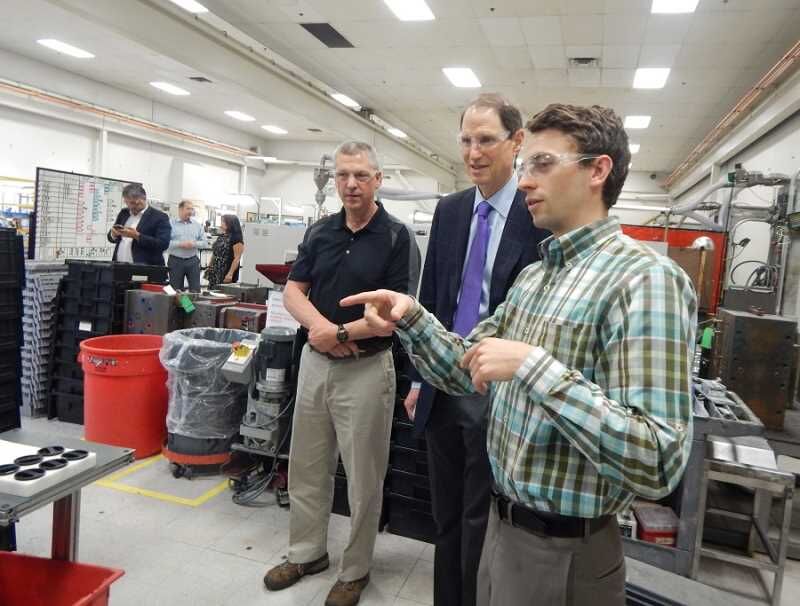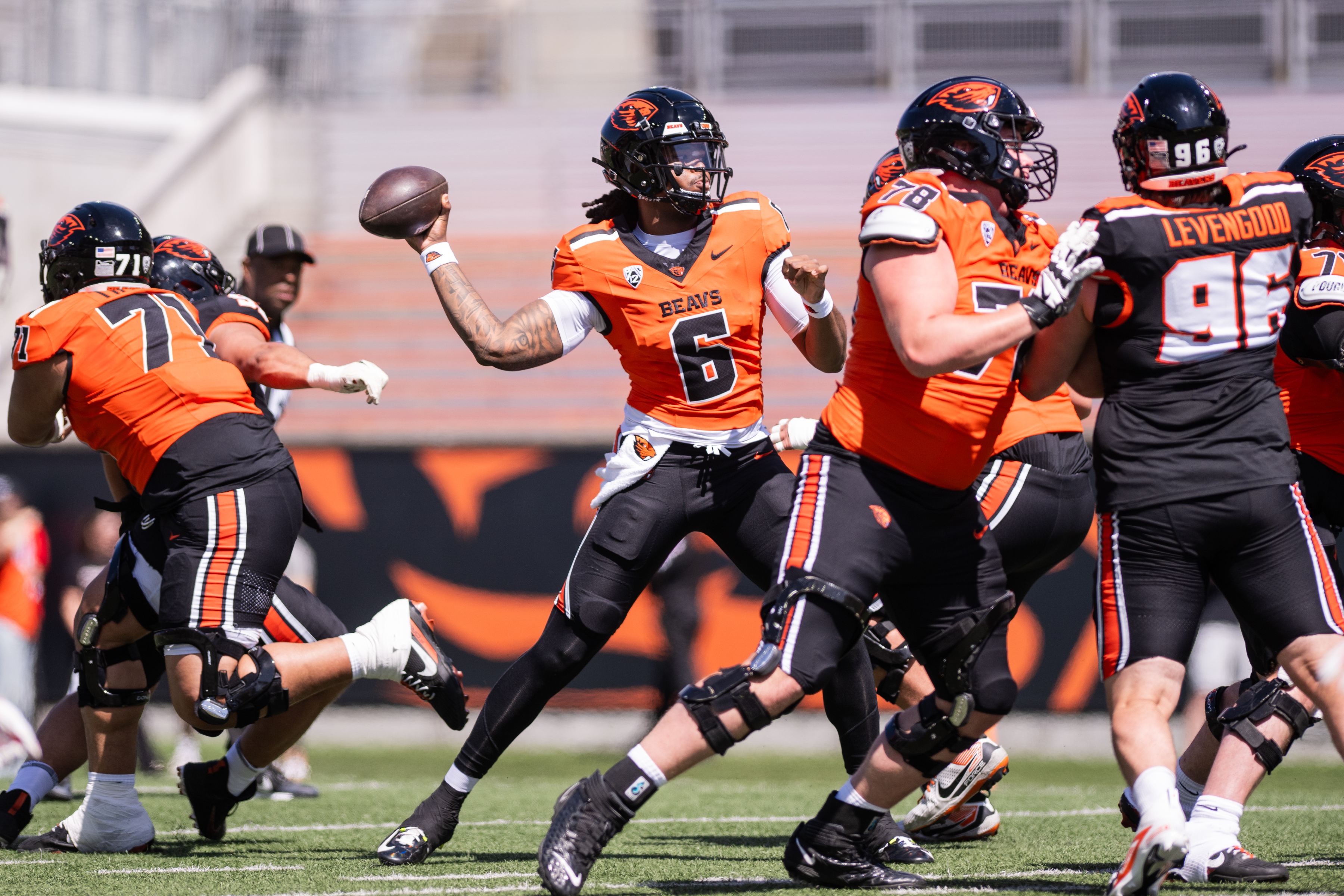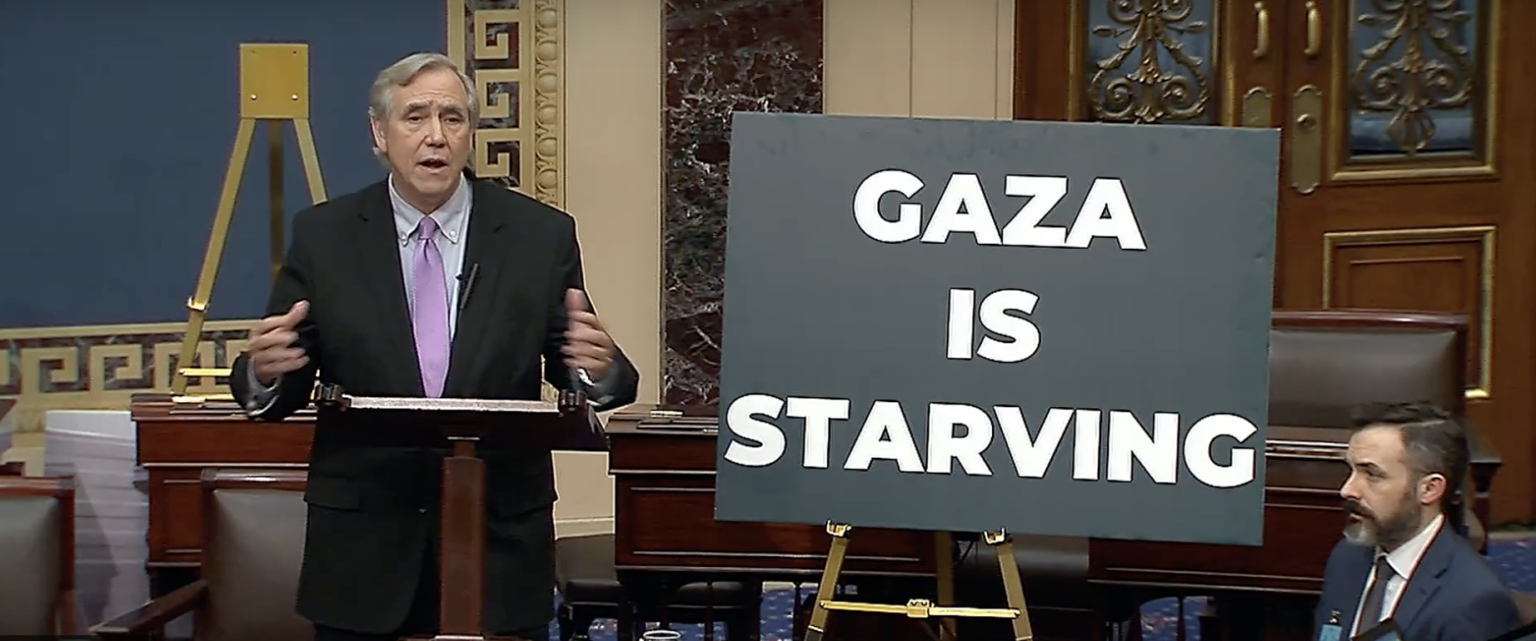Diving into the local high-tech world
Published 12:00 am Tuesday, May 10, 2016

- At Poly-Cast in Tigard, engineering manager John Schwend (left) and Sen. Ron Wyden listen as SHS and George Fox graduate Isaac Marshall explains how he modified a piece of equipment while he was an intern there.
Sen. Ron Wyden (D-Oregon) made two stops in Washington County on May 4, where he learned how Sherwood High School is graduating students equipped to compete in a high-tech world and how a company in Tigard is using those students.
Trending
At SHS, Wyden met staff and students in the Career & Technical Education (CTE) program, starting with the engineering department. Teacher John Niebergall introduced Wyden to several students, who demonstrated various pieces of equipment, including a laser-cutter and a 3-D printer.
During a brief stop in the woodworking shop, Wyden was intrigued with the body of a guitar being made, and he was handed a piece of polished wood with a groove down the center and a small wood map of Oregon with magnets on the back. After being told he would get the rest of the puzzle later, Wyden moved on to the welding shop, where he met with students who demonstrated welding equipment and teacher Allison Meadows.
The students handed Wyden a cool metal plate with his name cut out and room for the Oregon map, which fit perfectly in the groove of the wooden base. “I’m going to display this in my office,” Wyden said.
Trending
Wherever he went, Wyden peppered students with questions, including, “What kind of career do you want to pursue?” and “If you were me and wanting to work on education issues, what would your top priority be?”
He explained, “I have asked a lot of students that question, and what they want is a hands-on educational experience.”
The last stop was teacher Terrill Smith’s computer lab, where a general computer science class was underway. Wyden asked what they were working on, and one answer was a game, which Wyden suggesting they could incorporate with zombies.
“What would you be working on if you were in my shoes?” he asked before telling students how he went to college on a basketball scholarship and didn’t study very much. He said he mostly crammed before tests and forgot the information immediately afterwards and never got any hands-on experience.
Wyden pointed out that although SHS is an exception, Oregon has the fourth-lowest graduation rate in the country.
“We’ve done a lot in this state for the environment, healthcare and vote by mail,” he said. “I am the first U.S. senator to be elected totally by vote by mail. But our graduation rates are in the cellar.”
Wyden talked a little about the new education bill called Every Child Succeeds adding, “No Child Left Behind is teaching for the test.”
Six CTE students had been selected to meet with Wyden in the office conference room where they told him what they had been working on, including starting a T-shirt printing business, laser-cutting decorative water bottles, and creating software to make 3-D objects.
“We have school-sized equipment just like Nike and other businesses have,” Niebergall said. “So our students can basically walk into a business and know how to use the equipment.”
Wyden replied, “This is what I’ve heard over and over – the importance of personal education. The most valuable part of education is the personal learning.”
Wyden asked the students how many of them want to live in Oregon once they finish their higher education, and all except one raised their hands. “I want you young people to be able to live here if you want, but there aren’t always enough opportunities to work,” he said.
On the drive between SHS and Poly-Cast Inc. in Tigard, Wyden rode in a motor home driven by Niebergall, and among the passengers was School Board Director Eric Campbell, who is an engineer at Mentor Graphics and a recruiter for the company. He told Wyden he is looking for “kids who can solve problems they have never seen before.”
He added, “Our little high school in Sherwood offers almost as many college credits as Portland schools do, and in Oregon, only one high school in seven teaches computer science.”
But Niebergall pointed out that more technical education teachers are needed to teach those classes.
“I’m in favor of STEM, which needs more exposure and attention,” Wyden said. “This is important here, but it will be lifeline for rural schools.”
On the ride, Wyden shared a little about his bi-coastal life, where he divides his time between homes near Reed College in Southeast Portland and the Washington, D.C., area.
“My goal is to be in Oregon one week a month, but sometimes it works out to more, and other times less,” he said. “My idea of bliss is to leave Washington, D.C., on Thursday and come back 10 days later.”
As the RV pulled up at Poly-Cast on 72nd Avenue in Tigard, President Dan Leedom was there to greet Wyden and his party. Poly-Cast is a family-owned business founded in 1972 that employs about 75 people. It produces “creatively engineered injection-molded plastic parts (including) automotive parts, medical devices and sporting goods,” according to its website.
Leedom lives in Sherwood and originally reached out to Niebergall “to see what was going on in our programs,” Niebergall said.
That led to Leedom hiring Isaac Marshall, who graduated from SHS in 2012 and George Fox University in 2016 with a degree in electrical engineering, for three summers as an intern. Marshall, who was set to start a new job May 9 at Lam Engineering in Tualatin, explained to Wyden how he came up with a piece of automation on a machine that makes a four-wheel-drive part for Ford Motor Company while he worked at Poly-Cast.
John Schwend, Poly-Cast’s engineering manager, said, “Isaac’s level of preparedness was amazing. I thought, ‘Wow, these guys are hitting the mark.’ That started our connection with SHS.”
Wyden asked Leedom about product distribution, and Leedom replied, “Because we started here as a family-run business, we’re pretty regional,” but he added that the company has expanded its product distribution to China and Italy so far.
Wyden pointed out that “95 percent of our consumers are outside the U.S.,” and Leedom replied, “How do we make that transition? We’re looking at it.”
Everyone in the group donned safety goggles to tour the plant and watch workers and machinery in action; the group stopped at the machine that had been modified by Marshall, where a woman was making four-wheel-drive parts that resembled Thermos suction lids.
At another stop, Leedom showed Wyden a plastic curly-cue that was originally ordered by a chiropractor for people to adjust their own backs. “We were doing 150 a month and then got on Amazon and are doing 5,000 to 6,000 a month,” Leedom said.
He also showed Wyden propagation trays used to grow lettuce in the Salinas Valley in California.
After the tour, the group moved into the lunchroom where about a dozen employees were waiting to talk to Wyden.
“It is impressive that a small company in Oregon is producing a product for Ford Motor Co. that is used in its trucks’ four-wheel-drives,” Wyden said.
He explained, “No one knows exactly what senators do. In Congress, we talk about creating jobs, but we don’t have machines on our desks to do that — the jobs come from you. I support the climate that grows jobs.
“I am the senior Democrat on the committee that writes tax laws, and I like to hear suggestions on what you think we should be working on if you were in my shoes.”
Wyden was asked about the proposal for free four-year colleges, Obamacare, keeping terrorists and ISIS out of Oregon, the refugee crisis in Europe, Apple versus the Department of Justice, Medicare and tax breaks.
“I’m proposing that we take away tax breaks for companies shifting overseas, and I’m for growing red, white and blue jobs,” Wyden said. “With the conflicts in Congress, neither side will have their way. We must do problem-solving. That’s what I’m trying to do in the biggest challenges of our time.”
And to the Poly-Cast employees, he said, “I’d like to see what you’re making all over the world.”
After first serving in the U.S. House of Representatives, Wyden won a Senate seat in a special election in January 1996 and won again in November 1996. He was elected to his first full term in 1998 and re-elected again in 2004 and 2010; he is running in the November 2016 election.







